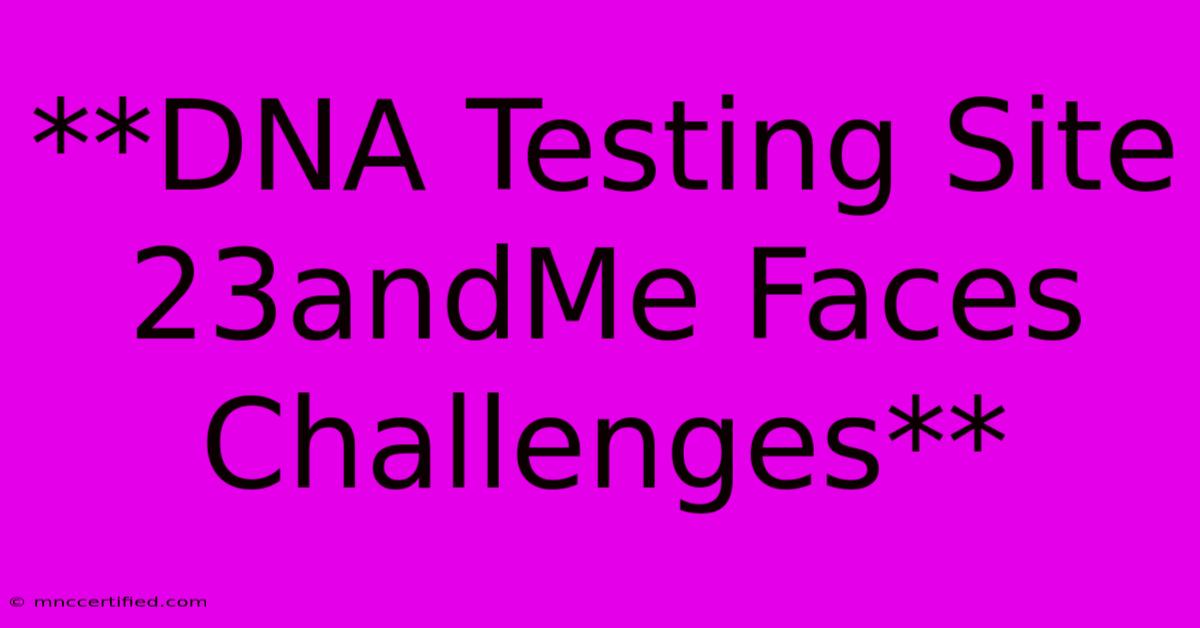**DNA Testing Site 23andMe Faces Challenges**

Table of Contents
DNA Testing Site 23andMe Faces Challenges: Privacy Concerns and Market Saturation
23andMe, the popular DNA testing company, has faced a number of challenges in recent years. While the company has enjoyed immense success in offering affordable and accessible genetic testing to millions of people, it's also grappling with increasing concerns about privacy, competition in a saturated market, and evolving regulatory landscapes.
Privacy Concerns
Data Security and Sharing: One of the most significant challenges facing 23andMe is the persistent issue of data privacy. Users entrust the company with their most sensitive personal information, their DNA, and concerns have been raised about the potential misuse of this data. While 23andMe claims to protect users' privacy, the company has been involved in controversies involving data sharing with third-party companies and the use of genetic data for research purposes.
Transparency and Consent: There's been criticism about the transparency of 23andMe's data handling practices and the extent to which users fully understand how their data is being used. Clearer and more detailed consent processes are needed to ensure individuals have control over their genetic information.
Increased Competition and Market Saturation
New Entrants and Lower Prices: The DNA testing market has become increasingly crowded with new players entering the field, offering competitive prices and a wider array of testing options. This has intensified the pressure on 23andMe to maintain its market share and innovate to stay ahead of the competition.
Shifting Consumer Preferences: Consumer interest in DNA testing has been steadily increasing for years, but there are signs of a potential market saturation point. As more people have taken DNA tests, there's been a decline in the novelty factor, leading some consumers to question the value proposition of these tests.
Regulatory Landscape
Data Protection Laws and Regulations: The legal landscape surrounding DNA testing is constantly evolving, with new data protection laws and regulations being implemented worldwide. These regulations place stricter requirements on companies like 23andMe to comply with data privacy standards and ensure responsible data handling.
Healthcare Integration and Direct-to-Consumer Genetic Testing: The intersection of genetic testing and healthcare is a complex and evolving area. Regulators are grappling with how to balance the potential benefits of direct-to-consumer genetic testing with concerns about the potential for misleading results and misinterpretations.
Looking Forward
23andMe is actively addressing these challenges by investing in data security measures, refining its consent processes, and diversifying its product offerings. The company is also expanding its focus beyond ancestry and health insights into areas like personalized medicine and drug discovery.
Navigating these challenges will require 23andMe to prioritize user privacy, adapt to evolving regulations, and continuously innovate to remain competitive in a rapidly evolving market. The future of DNA testing remains uncertain, but 23andMe's ability to address these critical issues will determine its long-term success.

Thank you for visiting our website wich cover about **DNA Testing Site 23andMe Faces Challenges**. We hope the information provided has been useful to you. Feel free to contact us if you have any questions or need further assistance. See you next time and dont miss to bookmark.
Featured Posts
-
Scholz Faces Crisis German Coalition Falls Apart
Nov 08, 2024
-
Baseball Diamond Diagram With Positions
Nov 08, 2024
-
Election Path To End German Stalemate
Nov 08, 2024
-
Lancashire M6 Crash One Dead Five Hurt
Nov 08, 2024
-
Nuggets Fans Get First Glimpse Of Westbrooks Game
Nov 08, 2024